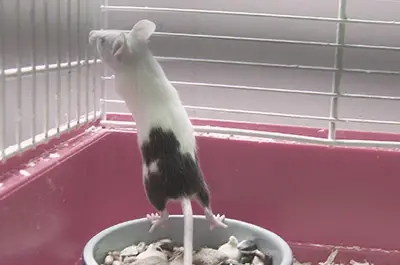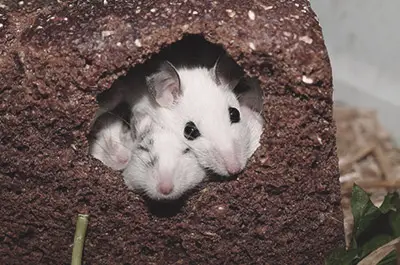Mice are popular pets for several reasons. They are small, easy to care for, and can be taught to do tricks. If you are considering getting a mouse as a pet, there are some things you should know to make sure your mouse stays healthy and happy. Here are 10 tips for taking care of your mouse!
Habitat and Caging.
One of the most important things you can do is make sure your mouse has a roomy and comfortable place to stay. A tiny cage might seem like a good idea, but mice need space to run around and play. Something as simple as an aquarium with a tight lid can be dangerous for these little guys (and gals),

A wire cage with a solid-floored base is best for your mouse, although some will accept having part of the bottom of their habitat made of wire. A wire floor enables the droppings to fall through, making them easy to clean up.
It’s also safer for your pet because it doesn’t allow them to catch and chew on the wire. The wire bottom helps to keep the cage dry and clean, but you must provide your mouse with a little box filled with bedding material (such as aspen shavings or carefresh) in one corner of the habitat. This will serve as a nesting spot for your pet, and it should not be changed unless it becomes dirty.
Mice should also be kept in an area of your home free from extreme temperatures (especially if they cannot go outside!) and other pets. Their habitat should also be placed somewhere relatively quiet. Loud noises can cause your pet distress, leading them to depression or other behavioral issues.
Diet & Nutrition.
Every mouse has its unique personality, which can be said about its diet preferences as well! Mice are omnivores, which means they eat both meat and vegetables. If you want your pet to stay healthy, the food you feed them must be nutritious.
Some mice will accept just about any type of food when they are offered it for the first time, but you should always be sure to have their food available at all times. That way, your pet can eat when it’s hungry.
A staple diet of lab block or rodent chow provides an excellent base for your mouse’s diet, although some people feel that these foods are less tasty than seeds and grains. These foods can be supplemented with fresh veggies and fruit to ensure your mouse stays healthy.
There are many options available for commercial foods intended for mice, but it’s important to remember that not all of them are nutritionally complete. Some may come with treats included, which is fine as long as they don’t make up too much of the diet.
You should also be careful when feeding your mouse to avoid overfeeding them, which is a common issue with pet rodents. A small training treat can be left in the habitat for a few days at a time to help you monitor what and how much your mouse is eating.
Habits & Behavior.
Mice are naturally curious creatures, but they are also very shy. For this reason, it’s essential to make sure their habitat is as comfortable and inviting as possible. Placing a few small toys in the cage will encourage your pet to explore and play (although you should always check for loose strings or other parts that could be chewed off). Mice love to climb and hide, so pieces of untreated wood or cardboard in the habitat can be a great addition.
Mice love exploring new things, so their living conditions need to be interesting. A good rule of thumb is to provide them with plenty of food in different shapes and textures, as well as wooden toys to climb on. They’re fun to watch, but you should also avoid keeping small objects that they could swallow because this could cause infection or blockages within their bodies.
Mice can also become very attached to their owners, and they may seek you out in the daytime.
Having another mouse in the same room as your pet can sometimes stress them out, so introducing them slowly might be a good idea. You should also remember that not all mice are friendly, and if yours becomes defensive, you will need to handle them with care.
Being kept as pets can make mice feel more secure because they’ll become used to the sounds their owners make. This means they aren’t likely to object to you opening their cage and making some noise when you come to feed them!
The more time your mouse spends out of its cage, the more comfortable it will become around people. You can allow your pet to roam on a table or on the floor for short periods so long as their enclosure is nearby and they’re always safely within your reach.
Handling your mouse.

Mice are highly intelligent little animals, which means they can sense when you’re nervous or upset. If this is the case, their instincts will tell them that they’re in danger which may lead them to become defensive. It’s important not to handle mice roughly because even if they start out tame, they may become nervous around people if their owner acts aggressively.
Even when you’re confident that your mouse isn’t likely to bite, it’s still best to handle them gently to avoid startling them. Always take care not to drop them or allow your hands to contact their teeth because this could cause injuries. Remember never to pick up a mouse by the tail because this will damage it.
As a general rule of thumb, you should follow these tips when handling mice:
- Always use two hands to pick up your pet.
- Never pull or drag them from their cage. If they don’t want to come out, just leave them alone. Handle them with care, and they’ll come to you when they’re ready.
- Keep the area around their cage clean so they don’t hide food there.
- Always double-check that your hands are free of dirt, soap, or anything else that could make them feel unwell before you pick up your mouse – this includes perfume, cologne, or anything else you might be wearing!
Cage hygiene.
Cleanliness is just as important for mice as it is for other animals, so you should pay close attention to their living conditions.
It’s also essential that you handle your pet at least once a day so they become used to human contact, even if it’s just for a few minutes. Hand-fed mice tend to be more relaxed around owners than those caught in the wild, so this is definitely.
You should only need to clean your mouse’s cage out about once a week, although you can do it more often if necessary. Don’t use strong cleaning products because these may upset your pet’s senses and leave them feeling unwell. Instead, use warm water and gentle soap (or another mild cleaner) to wipe away any waste and dirt from the surface of the cage.
Mice are nocturnal.
Mice sleep most of the day and become more active when it gets dark, so they might seem sleepy during the daytime. If an owner is not handling them, they might hide away in their nest for much of this time, making them difficult to spot.
Mice usually are active at night, and they should spend time out of their nest, even when it’s dark. If your pet isn’t doing this, you might need to consider whether or not they’re unwell because mice are nocturnal creatures by nature.
Mice are sociable animals.
Mice are very social creatures, and they rely on their friends and family for survival. This means it’s important that they live with other mice to feel safe and secure in their environment.

Pack-preferring animals, mice do best when kept in same-sex pairs or small groups, although a single mouse can also be a good pet! This is because they enjoy the company of others, and it helps to reduce their stress levels.
You should always avoid putting more than two mice in a cage together – especially if they’re both males because this can lead to fighting. Make sure you know whether your mouse is male or female before allowing them to live with another mouse because this can be difficult to work out.
Male mice tend to make the best pets, and they’re usually better at controlling their instincts than females, although there’s no real difference between males and females when it comes to handling them – only when breeding or caring for babies. Even if you do know your pet is a female,
If your mouse appears to be nervous, you might need to interact with them more frequently to build their trust. You can encourage this by leaving out special treats or nesting material they can use to make a nest for themselves.
Mice can be noisy pets.
This can be a problem if you’re trying to keep them in your bedroom or anywhere else where the noise might cause issues with other members of your family.
Mice are a little noisier than some other types of pets, but this is usually fine as long as they’re not getting into fights or it’s otherwise disrupting their owner, so you might want to consider keeping them in a spare room or somewhere else where they can play without disturbing anyone.
Mice love to explore.
Mice need to fit out in a large enough cage that they can roam around in, but also be safe and secure. This means it’s essential you provide them with a place where they can run around, play games, and have fun – while at the same time ensuring they don’t get hurt or escape from their enclosure.
Mice love to explore new places, and they need a space to do this without risk of injury.
Large mice homes should be furnished with toys, ramps, tunnels, and other features that make playing at night more fun – while ensuring your pet is kept safe from harm or getting out of the cage when it’s not meant to.
Mice are intelligent creatures.

Mice are intelligent creatures, but they might not always listen to instructions or requests right away. You can encourage your pet to listen by rewarding them for good behavior with treats, praise, or another reward that makes them happy.
Because mice are so intelligent, you should take great care when handling them to make sure they feel as relaxed as possible.
Mice have an excellent memory, and you must handle them correctly if you want them to trust you. If you move their cage around a lot or disturb their nest for any reason, your pet might hide away from you when it gets dark because they don’t want to risk running into humans.
Mice are incredibly delicate pets that should be treated with the same care as any small animal.
Treat your pet with kindness, respect, and understanding to keep them happy, healthy, and stress-free!
Conclusion.
Mice make wonderful pets, but you must know how to take care of them properly – which means reading up on their needs and providing them with the right environment and lifestyle that suits their needs. You should also keep mice away from other pets if they’re not social animals and handle them with care to ensure they don’t become scared of humans.
Most importantly, remember that mice are delicate creatures that need your love and affection.
Please leave a comment. I appreciate it, thank you!

Meet Anna West! A connoisseur of all things stylish, Anna has an innate ability to weave the latest in fashion trends seamlessly into her writings. But her expertise doesn’t stop at fashion for modern women. Within the folds of her articles, you’ll also find a sprinkle of home decoration wisdom, a dash of pet care advice, and thoughtful insights on relationships. While fashion remains her forte, Anna’s multifaceted perspective ensures that her readers get a well-rounded dose of inspiration for various facets of life. Dive into Anna’s world, and discover a blend of style, elegance, and practical wisdom. Stay informed, inspired, and always in vogue with Anna West.
Reviewed By: Joanna Perez and Marcella Raskin
Edited By: Lenny Terra
Fact Checked By: Brenda Tillman
Photos Taken or Curated By: Matthew Mansour